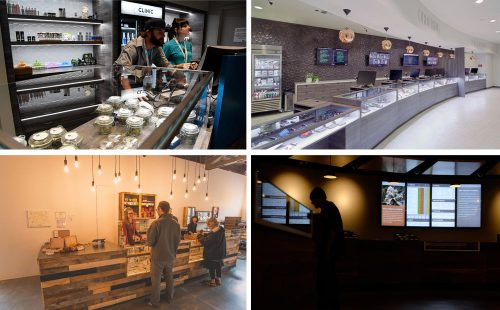Here at Cannabist HQ, we’re taking a look back at the provocative interviews on our talk show and the most memorable stories covered on the site through the turbulent but awesome year that was 2016.
The Cannabist Show’s Producer Vince and interim editor-in-chief Aleta Labak dive deep into the past 12 months. National policy and business reporter Alicia Wallace joins the fray as we weigh the major themes of 2016: America’s ever-growing cultural acceptance of cannabis, notable federal moves and of course the momentous November election. Here’s a recap of the biggies:
Cultural shift
Americans’ approval of marijuana legalization highest in history: A Gallup poll released in October shows 60 percent of American adults now say that marijuana should be legal, the highest level of support in nearly a half-century of polling on the question. The Gallup poll tracks closely with numbers from the Pew Research Center showing 57 percent support for legalization. When Gallup first asked about legalization in 1969 only 12 percent of Americans supported the proposition. Support rose briefly to 28 percent in the late ’70s, but languished in the low- to mid-20s throughout much of the ’80s and ’90s, as the federal war on drugs hit a fever pitch. –Report by The Washington Post’s Christopher Ingraham

Corporate cannabis, part one: Scotts Miracle-Gro is now the majority owner of Boulder’s AeroGrow International Inc., the indoor gardening products company that was Scotts’ first foray into hydroponics. AeroGrow announced that Scotts subsidiary SMG Growing Media Inc. upped its ownership stake in the Boulder firm to 80 percent. Scotts, via its Hawthorne Gardening Co. division, has been making big plays in the hydroponics industry by spending nearly a half-billion dollars buying up sector-leaders such as General Hydroponics, Gavita and Botanicare. –Report by The Cannabist’s Alicia Wallace
Corporate cannabis, part two: Colorado-based OpenVape made waves when the company made a bid to have its name included among the likes of banks, energy corporations and alcohol companies: atop a professional sport team’s stadium. –Report by The Cannabist staff
Will the NFL ever come around and change its cannabis policy? In 2014, the National Football League revamped its drug policy, relaxing some of the previous edicts about marijuana use. The threshold for a positive test increased from 15 nanograms per milliliter to 35 ng/ml, and the punishment for a positive test changed, as well. Although a first-time offense still results in the player entering a substance abuse program without a suspension, the second offense is a two-game fine and the third a three-game fine. That means it takes three strikes before a player gets suspended. But will the NFL cannabis policy ever get more real about THC and CBD? Denver Post sports reporter Nicki Jhabvala predicts that the NFL is headed for a policy revamp: “The more active players are coming out in support of that. And when you get the active players speaking out, the owners are going to have to support them, because they’re paying them and they need them — this is their product.”–Report by The Cannabist staff
Cannabis real estate company hits Wall Street: The first cannabis company on a major U.S. stock exchange made its Wall Street debut Dec. 1. Innovative Industrial Properties (NYSE: IIPR) announced it sold 3.35 million shares at $20 per share, raising $67 million in its initial public offering, which had been delayed and downsized. Shares opened at $20.25 but closed at $19.15 for IIP, a San Diego, Calif.-based real estate investment trust for medical cannabis facilities. –Report by The Cannabist’s Alicia Wallace

Federal rulings
DEA files docs, says no to rescheduling marijuana: In August, the U.S. Drug Enforcement Administration filed documents with the Federal Register outlining its denial of petitions to reschedule marijuana. The filings included the rescheduling decision, a rejection of the medical use of marijuana, statements of principles on industrial hemp, and a move to allow more entities to cultivate marijuana for research purposes. The DEA’s denial of the petitions was rooted in the recommendations of the U.S. Food and Drug Administration and the Department of Health and Human Services, which both conducted scientific and medical evaluations and eventually determined that marijuana should remain a Schedule I substance under the Controlled Substances Act. “We are truly tethered to the science, bound by statute,” DEA spokesman Russell Baer said. –Report by The Cannabist’s Alicia Wallace
New DEA rule on extracts, CBD causes commotion in cannabis industry: A little three-page document published in the U.S. Federal Register in mid-December sent some fairly big shock waves through the cannabis industry. The DEA filed a final rule notice to establish a Controlled Substances Code Number for “marihuana extract,” and subsequently maintaining marijuana, hemp and their derivatives as Schedule I substances. Following some initial reports on the rule and potential effects, the speculation and confusion swelled among cannabis businesses and advocates about just what actions the government was taking on cannabinoids, cannabidiol (CBD) and hemp.–Report by The Cannabist’s Alicia Wallace
Election 2016
Marijuana legalization steams ahead in America: The 2016 election’s greatest victor is not yet clear, but President-elect Donald Trump and the cannabis legalization movement, at the very least, are top contenders for the title. While Trump pulled off a come-from-behind victory few anticipated, the marijuana movement continued its definitive march forward with eight mostly decisive wins in nine high-profile races that spanned the entire country. And while most of the pot industry favored Trump’s opponent, Democrat Hillary Clinton, the president-elect has repeatedly said that he will leave the 420-legal states alone — a campaign promise that, if honored, is likely setting the stage for eventual federal legalization. But before we gaze too far into the unknown future, let’s address just how significant this historic present truly is for the full-steam-ahead legalization movement. –Report by The Cannabist’s Ricardo Baca

Trump’s pick for attorney general not fan of legal weed: The senator nominated to serve as the next U.S. attorney general is on record saying cannabis is “dangerous” and that “good people don’t smoke marijuana.” President-elect Donald Trump’s pick of Alabama Sen. Jeff Sessions as the nation’s top law enforcement officer should “scare the hell out of the marijuana industry,” drug policy expert John Hudak told The Cannabist on Nov. 18. Sessions, who has railed against marijuana legalization, could play a prominent role in the future of the burgeoning $7.4 billion industry. After November’s election, 28 states and Washington, D.C., have approved medical marijuana programs, and eight have expanded to full adult use of recreational cannabis. –Report by The Cannabist’s Alicia Wallace
Editorial: Don’t tread on weed: Colorado’s legal cannabis industry topped $1 billion in sales in the first 10 months of 2016. While anyone familiar with the trends expected a breakthrough year, the industry’s early surpassing of that lofty mile-marker presents plenty of cause for reflection. We bring it up because a new top cop will soon take the helm under President-elect Donald Trump, and there is some cause for worry should nominee Jeff Sessions be confirmed by the U.S. Senate.–Editorial by The Denver Post Editorial Board
Cannabis commerce in Colorado and beyond
Fatal shooting of pot shop security guard: Could it have been avoided? The death of Travis Mason, a Colorado dispensary security guard who was slain during an attempted robbery in June, was devastating to those in the legal cannabis business, says Ricky Bennett, a former Aurora police chief who now heads Blue Line Protection Group Inc. “I’ve taken a lot of calls from wives and girlfriends concerned about their employees,” Bennett says. “This is one of those things, even though we may be a competitor, we’re going to come together and we’re going to work together to ensure that legal businesses are properly protected.”–Report by The Cannabist Staff
A universal THC symbol for edibles and other new rules: As of October, medical and recreational marijuana edibles and other cannabis products are required to be stamped with a new “universal symbol” aimed at raising public safety awareness about infused goods. In addition to new equivalency regulations for retail marijuana, other rules include the barring of the words “candy” or “candies” in marijuana products as well as the inclusion of potency and contaminant testing information. “The No. 1 goal here: It’s about public safety, it’s about public health, and, above all, it’s sensitive to the risk this poses to children,” said Jim Burack, director of the Marijuana Enforcement Division.–Report by The Cannabist’s Alicia Wallace

The new trend in U.S. marijuana stores? A focus on thoughtful, high-end shop design: Marijuana shops across the United States are getting some work done – a tuck here, some implants there and sometimes an entire facelift. Call it “Extreme Makeover: Dispensary Edition.” Pot shops, once the sparsely decorated storefronts more concerned about DEA raids and federal seizures than LED display lights and high-end fixtures, are coming into their own in 2016. They’re hiring big-name architects and trendy design firms. They’re rebranding using mood boards and open-staff discussions on aesthetics. And they’re reinventing the way consumers shop for cannabis.–Report by Ricardo Baca





